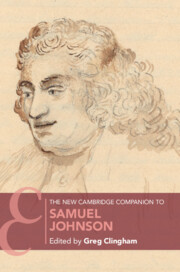Book contents
- The New Cambridge Companion to Samuel Johnson
- The New Cambridge Companion to Samuel Johnson
- Copyright page
- Contents
- Figures
- Contributors
- Short Titles and Note on the Text and Cover Art
- Introduction: Contemporary Johnson
- Chapter 1 Johnson, Ethics, and Living
- Chapter 2 Johnson and the Essay
- Chapter 3 Johnson and Renaissance Humanism
- Chapter 4 Johnson and Language
- Chapter 5 Johnson and British Historiography
- Chapter 6 Johnson and Fiction
- Chapter 7 Johnson and Gender
- Chapter 8 Johnson, Race, and Slavery
- Chapter 9 Johnson’s Politics
- Chapter 10 Johnson’s Poetry
- Chapter 11 Johnson’s Editions of Shakespeare
- Chapter 12 Johnson’s Lives of the Poets: A Guided Tour
- Chapter 13 Johnson as Biographer
- Chapter 14 Johnson and Travel
- Chapter 15 Johnson and Disability
- Chapter 16 Representing Johnson in Life and After
- Chapter 17 Johnson among the Scholars
- Further Reading
- Index
- Cambridge Companions To …
Chapter 15 - Johnson and Disability
Published online by Cambridge University Press: 22 September 2022
- The New Cambridge Companion to Samuel Johnson
- The New Cambridge Companion to Samuel Johnson
- Copyright page
- Contents
- Figures
- Contributors
- Short Titles and Note on the Text and Cover Art
- Introduction: Contemporary Johnson
- Chapter 1 Johnson, Ethics, and Living
- Chapter 2 Johnson and the Essay
- Chapter 3 Johnson and Renaissance Humanism
- Chapter 4 Johnson and Language
- Chapter 5 Johnson and British Historiography
- Chapter 6 Johnson and Fiction
- Chapter 7 Johnson and Gender
- Chapter 8 Johnson, Race, and Slavery
- Chapter 9 Johnson’s Politics
- Chapter 10 Johnson’s Poetry
- Chapter 11 Johnson’s Editions of Shakespeare
- Chapter 12 Johnson’s Lives of the Poets: A Guided Tour
- Chapter 13 Johnson as Biographer
- Chapter 14 Johnson and Travel
- Chapter 15 Johnson and Disability
- Chapter 16 Representing Johnson in Life and After
- Chapter 17 Johnson among the Scholars
- Further Reading
- Index
- Cambridge Companions To …
Summary
This chapter considers how Samuel Johnson’s various disabilities shaped perceptions of him during his lifetime and continue to influence critical and biographical assessments of his personality, conversational prowess, and literary style. Given that modern conceptions of disability formed in the nineteenth century, I discuss why interpretations of Johnson’s mental and physical impairments might be better served by focusing on terms that were current in the eighteenth century, such as melancholy and peculiarity. Johnson’s friends and associates frequently commented on the “peculiarity” of his bodily movements. I examine episodes in which these peculiarities inspired people to stare at Johnson or to imitate him. These episodes reveal the deeper significance that eighteenth-century men and women ascribed to unusual and surprising forms of embodiment. I conclude by exploring the intriguing connections critics have made between Johnson’s “peculiar” body and his distinctive prose style.
Keywords
- Type
- Chapter
- Information
- The New Cambridge Companion to Samuel Johnson , pp. 204 - 217Publisher: Cambridge University PressPrint publication year: 2022

